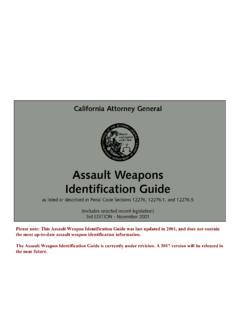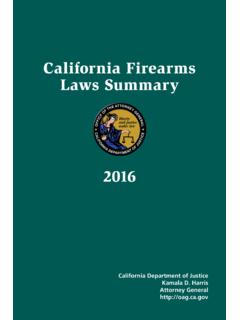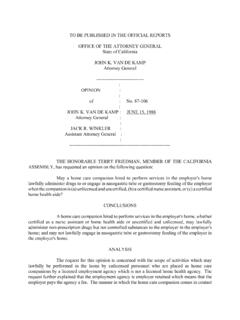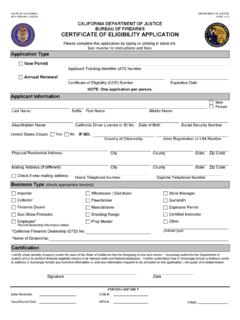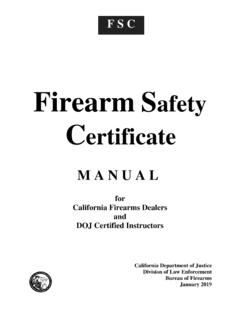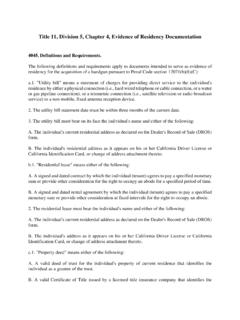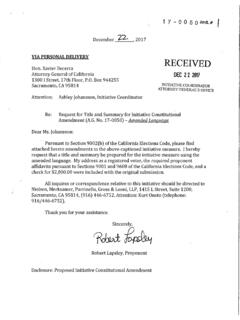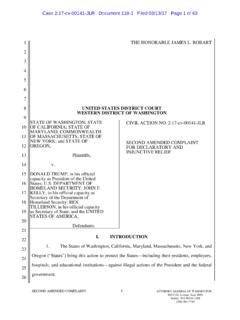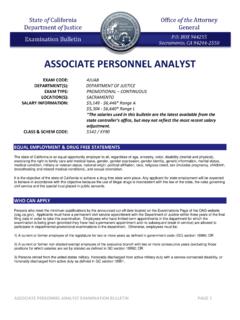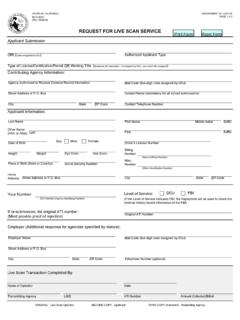Transcription of Public Records Act Training - State of California
1 Public Records Act TrainingOffice of the California Attorney General California Constitution, Article 1,Section 3, Subdivision B Constitutional amendment added by Proposition 59 Provides generalized right of access to be implemented by statute Statutes that provide access are to be liberally construed California Constitution, Article 1, Section 3, Subdivision B Statutes that restrict access are to be narrowly construed Legislature must make findings justifying the need for new statutory provisions that restrict access California Constitution, Article 1,Section 3, Subdivision B Constitutional provision expressly preserves: constitutional provisions or statutes restricting access that were in existence at the time.
2 California Constitution, Article 1,Section 3, Subdivision B Constitutional provision expressly preserves: individual rights of privacy. the rights of due process and equal protection of the laws. Applicable Statutes Public Records Act (PRA), Government Code section Provides Public access to State and localgovernment Records . Applicable Statutes Legislative Open Records Act, GovernmentCode section 9070-9080 Provides Public access to Records of the Legislature. Applicable StatutesJudicial Records Case law provides access to judicial Records .
3 Applicable Statutes Freedom of Information Act (FOIA), 5 Section 552 Provides Public access to Records of the federal government. Applicable Statutes If Records are mistakenly sought under FOIA, California agency should: explain that FOIA covers federal government Records . explain that PRA covers California government Records . provide Records in accordance with PRA. Applicable Statutes Freedom of Information Act (FOIA), 5 Section 552 Provides Public access to Records of the federal government. Applicable Statutes Judicial Records Case law provides access to judicial Records .
4 Applicable Statutes Information Practices Act (IPA) vs. Public Records Act (PRA) PRA All government Records are disclosable unless specifically made exempt Applies to State and local government Records Applicable Statutes Information Practices Act (IPA) vs. Public Records Act (PRA) How to reconcile these conflicting laws? IPA contains exemption for all Records disclosed under PRA. Therefore, IPA does not shield Records from disclosure that are otherwise disclosable under the PRA. Applicable Statutes Information Practices Act (IPA) vs.
5 Public Records Act (PRA) Records that are exempt from disclosure to Public under the PRA may be accessible to the subject of the Records under the IPA. Public Records Act: PurposesAccess to information about the conduct of the Public s business is a fundamental and necessary right of every person in the State In providing access, PRA remains mindful of individual privacy rights Public Records Act: Purposes Access permits Public to monitor governmental activities Agency cannot deny access to disclosable Records based on requester s intended usage Public Records Act: Definitions Public record defined.
6 Any writing that is owned, used or retained by a government agency in the conduct of its official business. Public Records Act: Definitions Writing defined: Any means of recording information including paper, audio tape, video tape, compact disc, DVD, computer diskette, computer hard drive, etc. Public Records Act: Definitions E-mail is expressly covered. Issues: When is email no longer a record ? When you place it in the trash? When it leaves your hard drive? When it is erased from the agency s back-up tape? Public Records Act: Definitions During discovery in litigation, agency may be required to recover email from back-up tapes At present, there are no cases or opinions regarding retrieval of email trash under the PRA.
7 PRA and litigation serve very different purposes. Based on the purposes of the PRA as discussed in Rogers v. Superior Court (1993) 19 469, it seems unlikely that agencies would be asked to retrieve Records from back-up tapes under the PRA. Making A Request If agency were required to extract information from back-up tapes under PRA, full cost recovery likely (see subsequent discussion of costs.) Making A Request Request may be made orally or in writing Recommend that agency confirm oral requests in writing Written requests facilitate agency compliance by reducing confusion about the Records requested and permitting agency to track the request Making A Request Request need not identify an exact record Request may identify Records by their general content Making A Request Request must still be sufficiently precise to permit the agency to locate the Records Request should not be unduly burdensome Making A
8 Request Request should be specific and focused (Rogers v. Superior Court (1993) 19 469.) Specific and focused requests facilitate prompt disclosure by government Making A Request Open ended requests: Are burdensome Frustrate agency Are expensive for requester May lead to non-compliance Making A Request When a request is not specific and focused, the agency has a duty to assist the Public in focusing the request Assist in identifying requested information Describe physical location of the record Making A Request When a request is not specific and focused.
9 The agency has a duty to assist the Public in focusing the request Describe technology in which the record is housed Help Public to overcome any practical barriers to access Agency Duty To Search Agency must make reasonable efforts to locate requested Records . At a minimum, such efforts should include: consulting record indexes consulting knowledgeable people looking in logical places Agency Duty To Search Special rule for electronic Records record must be provided in electronic format used by the agency if requested Software developed by the government is not disclosable Commercial software is not disclosable Data housed in protected software may still be disclosable Inspection Of Records General Rule Agency Records may be inspected at any time during regular office hours Inspection Of Records In reality.
10 The agency may need to: locate the requested Records gather multiple Records for inspection redact exempt information prior to inspection Appointment to inspect Records may be necessary under these circumstances Requesting Copies Of Records Agency should provide Records promptly Agency has up to 10 days to: determine if it will comply with the request, and notify the requester of its determination. Requesting Copies Of Records Agency may extend period to make this determination for up to 14 days if there is aneed to: communicate with field offices examine voluminous Records Requesting Copies Of Records Agency may extend period to make this determination for up to 14 days if there is a need to: communicate with others who have an interest in the Records .
